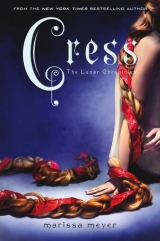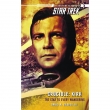
Текст книги "Cress"
Автор книги: Marissa Meyer
Жанр:
Детская фантастика
сообщить о нарушении
Текущая страница: 13 (всего у книги 27 страниц)
Jina approached a girl who sat behind the desk and they spoke in their other language, before she turned back to them. “They’re going to keep your room on our tab. They have a small kitchen here—order whatever you need. I have work to do, but I will ask about some shoes for you when I have a chance.”
Cress thanked her repeatedly until Jina trotted off to complete her business.
“Room eight, upstairs,” said the clerk, handing Cress a small tag embedded with a sensor key. “And please do join us for our nightly Royals competition in the lobby restaurant to your left. The first three hands are complimentary to guests.”
Thorne cocked his head toward the dining area. “You don’t say.”
Cress eyed the players gathered around the table. “Do you want to go see?”
“No, not right now. Let’s find our room.”
On the second floor, Cress found the door marked with a black-painted 8. As she swiped the tag and opened the door, her attention landed first on a bed set against the wall, draped with cream-colored netting that hung from four tall posts. Pillows and blankets with gold embroidery and tassels were more elaborate by far than the linens she’d had on the satellite, and infinitely more inviting.
“Describe,” said Thorne, shutting the door behind them.
She gulped. “Um. Well. There’s … a bed.”
Thorne gasped. “What? This hotel room comes with a bed?”
She scowled. “I mean, there’s only one.”
“We are married, darling.” He wandered around the room until his cane struck the writing desk.
“That’s a little desk,” she said. “There’s a netscreen above it. And over here’s a window.” She pulled back the curtains. The angled sunlight cut across the floor. “We can see the whole main street from here.”
She heard a thud and spun around. Thorne had kicked off his shoes and collapsed spread-eagle on the mattress. She smiled, wanting little more than to crawl up beside him and rest her head on his shoulder and sleep for a long, long time.
But there was one thing she wanted even more.
Through the room’s only other door, she could make out a tiny porcelain sink and an old-fashioned claw-foot tub. “I’m going to take a bath.”
“Good idea. I’ll be right behind you.”
Her eyes widened, but Thorne was already laughing. He propped himself up on his elbows. “I mean,” he said, flicking his fingers through the air, “I’ll take one when you’re done.”
“Right,” she murmured, and slipped into the washroom.
Cress may not have ever been in an Earthen washroom before, but she knew enough to realize that this was not the top of latrine-technological advancement. The small overhead light functioned via an actual switch on the wall, rather than computer, and the sink faucet had two water-spotted handles for warm and cold. The shower was a giant metal disk positioned over the free-standing tub and a lot of the white porcelain had been damaged with time, revealing black cast iron underneath. A bar was hung with plush white towels, in far better shape than the towel Cress had used on the satellite.
She pulled her clothes off with more than one sigh of contentment. Her bottom layers clung to her with a layer of sweat and grime. The bandages on her feet were filled with sand and dried blood, but the blisters had been reduced to raw pinkish skin. She threw everything into a pile on the floor and turned on the water. It came on hard and cold. She got in as soon as she could stand it and found that it felt shockingly good against the sunburns on her face and legs.
The water heated fast and soon a cloud of steam was wafting up around her. She found a bar of soap, packaged in waxy paper. With a moan of ecstasy, Cress sat down in the water and lathered up her hair, amazed at how short and light and easy to clean it was.
As she soaked, she started to hum, imagining her favorite opera music blaring through the satellite speakers. Surrounding and uplifting her. Her quiet humming turned into singing, the words whimsical and foreign. She sang one of her slow Italian favorites, humming the melody when she forgot the words. By the time she reached the end of the song, she was beaming beneath the fall of water.
Cress opened her eyes. Thorne was leaning against the washroom’s doorway.
She pushed herself to the back of the tub and wrapped her arms over her chest. A cascade of water splashed onto the floor. “Captain!”
His grin widened. “Where did you learn to sing like that?”
Her face flamed. “I—I don’t—I’m not wearing any clothes!”
He raised an eyebrow. “Yes. I’m aware of that.” He pointed to his eyes. “No need to rub it in.”
Cress curled her toes against the bottom of the tub. “You shouldn’t have been … you shouldn’t…”
He held up his hands. “All right, fine, I’m sorry. But that was beautiful, Cress. Really. What language was it?”
She shivered, despite the steam. “Old Italian. I don’t know what all the words mean.”
“Huh.” He turned toward the sink. “Well … I liked it.”
Her mortification began slipping away as she watched him fumble around for the faucet.
“Do you see any washcloths?”
She told him where to find them and after knocking a second bar of soap onto the floor, he had found a clean cloth and was soaking it in the sink.
“I think I might go down to the lobby for a bit,” he said, swiping the cloth over his face and leaving streaks of clean amid the dirt.
“Why?”
“See if I can get more information on this place. If we can find one of those abandoned neighborhoods, that would be the best place for Cinder and the others to come get us … after we contact them.”
“If you give me a minute, I can…” She trailed off, gaping at Thorne as he peeled off his shirt. Her heart stuck in her throat as she watched him wring out the cloth, before washing off his arms and neck, chest and underarms. Setting the cloth aside, he cupped his hands beneath the faucet and slicked water through his hair.
Her fingers twitched with the sudden irrepressible desire to touch him.
“That’s all right,” he said, as if she hadn’t just lost the ability to form coherent sentences. “I’ll bring us back some food.”
Cress splashed herself with the water, willing her brain to focus. “But—you said there are things to trip over and that I shouldn’t leave you and … don’t you want me to come?”
His hand searched around the walls until it stumbled across one of the hanging towels. He pulled it off the rack and briskly rubbed it over his face and through his hair, making it stand on end. “No need. I won’t be long.”
“But how will you—”
“Really, Cress. I’ll be fine. Maybe you can take a look at that netscreen, see if you can figure out some way to contact the crew.” He grabbed his shirt from the counter and shook it out, sending dust and sand flying, before pulling it over his head. He retied the bandanna over his eyes. “Be honest. Do I look like a famous wanted criminal right now?”
He struck a pose, complete with dazzling smile. With the messy hair, filthy clothes, and bandanna, she had to admit that he was almost unrecognizable from his prison photo. Yet somehow still heart-throbbingly gorgeous.
She sighed. “No. You don’t.”
“Good. I’ll see about getting us some clean clothes while I’m down there too.”
“Are you sure you don’t need me?”
“I was overreacting before. We’re in civilization now. I’ve got this.”
He was all charisma as he blew her a kiss and left.
Twenty-Nine
Stepping back from the Rampion’s hulking side, Cinder shaded her eyes with one arm and peered up at their slipshod work. Jacin was still up on one of the squeaky metal ladders the townspeople had brought them, painting over all that remained of the ship’s signature decoration—the lounging naked lady, the mascot that Thorne had painted himself before Cinder had ever met him. Cinder had hated the painting from the moment she laid eyes on it, but now she was sad to see it covered up. Like she was erasing a part of Thorne, a part of his memory.
But word had gotten out through the media that the wanted ship had this very specific marking, and that was unacceptable.
Swiping a bead of sweat from her brow, Cinder surveyed the rest of their work. They didn’t have enough paint to cover the entire ship, so they’d opted to focus on the main ramp’s enormous side panel, so that it would at least look like that exterior piece had been fully replaced, which wasn’t uncommon, rather than looking like they had tried to cover something up, which would defeat the purpose.
Unfortunately, it seemed that as much black paint had ended up on the dusty ground and the townspeople, who had come out in droves to help them, than had actually ended up on the ship. Cinder herself had paint dried on her collarbone, her temple, clumped in her hair, and stuck in the joints of her metal hand, but she was relatively unscathed compared with some of their assistants. The children in particular, eager to be helpful at first, had soon made a game of seeing who could paint up their bodies to look the most cyborg.
It was a strange sort of honor. Since Cinder had arrived, she’d been seeing this mimicry more and more. The backs of T-shirts illustrated with bionic spines. Shoes decorated with bits of assorted metal. Necklaces hung with washers and vintage lug nuts.
One girl had even been proud to show Cinder her new, real tattoo—wires and robotic joints overtaking the skin of her left foot. Cinder had smiled awkwardly and resisted the urge to tell her that the tattoo wasn’t cybernetically accurate.
The attention made Cinder uncomfortable. Not because she wasn’t flattered, but because she wasn’t used to it. She wasn’t used to being accepted by strangers, even appreciated. She wasn’t used to being admired.
“Hey, mongrels, try to stay in the lines!”
Cinder looked up, just as Jacin flicked his paintbrush, sending a splatter of black paint at the three children beneath him. They all shrieked with laughter and ran for cover beneath the ship’s underside.
Wiping her hands on her cargo pants, Cinder went to look at the finger painting the kids had been doodling on the other side of the ramp’s plating. Simple stick figures depicted a family holding hands. Two adults. Three children of various heights. And at the end—Cinder. She knew it was her by the ponytail jutting out from the side of her head and how one of the stick figure’s legs was twice as wide as the other.
She shook her head, baffled.
The ladder shook beside her as Jacin clambered down. “You should wipe it off,” he said, unhooking a damp rag from his belt.
“It’s not hurting anything.”
Scoffing, Jacin draped the rag over her shoulder. “The whole point of this is to get rid of obvious markings.”
“But it’s so small.…”
“Since when are you so sentimental?”
She blew a strand of hair out of her face. “Fine.” Pulling the rag off her shoulder, she set to scrubbing the paint off before it could dry. “I thought I was the one giving the orders around here.”
“I hope you don’t really think I’m here just to be bossed around some more.” Jacin dropped his paintbrush into a bucket at the ladder’s base. “I’ve taken enough orders in my life.”
Cinder refolded the rag, searching for a spot that wasn’t already soaked through with paint. “You have a funny way of showing loyalty.”
Chuckling to himself, though Cinder wasn’t sure what he found so amusing, Jacin stepped back and peered up at the enormous black square that now made up the ship’s main ramp. “Good enough.”
Scrubbing away the last bit of the painting—her own amateur portrait—Cinder stepped back to join him. The ship no longer looked like the Rampion she’d come to think of as home. It no longer looked like the stolen ship of Captain Carswell Thorne.
She swallowed the lump in her throat.
All around her, strangers were helping to gather up the painting supplies, scrubbing paint off one another’s faces, pausing to take enormous drinks of water, and smiling. Smiling because they’d spent the morning together, accomplishing something.
Somehow, though Cinder knew she was at the center of it all, she couldn’t help feel disconnected from the camaraderie, the friendships that had been forged over years of being part of one community. And soon, she would be leaving. Maybe, someday, even returning to Luna.
“So. When do we start your flying lessons?”
Cinder started. “Excuse me?”
“Ship needs a pilot,” said Jacin, nodding toward the front of the ship, where the cockpit windows were glinting almost blindingly bright in the sun. “It’s time you learned how to fly it yourself.”
“But … aren’t you my new pilot?”
He smirked. “In case you haven’t noticed, people tend to get killed around you. I don’t think that’s a trend that’s bound to stop any time soon.”
A boy a few years younger than Cinder ran up to offer her a bottle of water, but Jacin took it out of his hand before Cinder could and took a few long drafts. Cinder would have been annoyed, if his words—at once so practical and so painful—weren’t keeping her from feeling anything other than shock.
“I’ll start teaching you the basics after we eat,” he said, passing the bottle to her. Cinder took it numbly. “Don’t worry. It’s not as hard as it looks.”
“Fine.” Cinder finished off the water. “It’s not like I’m busy trying to prevent a full-scale war or anything.”
“Is that what you’re doing?” He eyed her suspiciously. “Here I thought we were painting a spaceship.”
A comm pinged in the corner of Cinder’s vision. From Dr. Erland. She tensed, but the comm was only two tiny words that made her entire world start spinning again. “He’s awake,” she said, mostly to herself. “Wolf is awake.”
Turning away from the ship and lingering townsfolk, Cinder thrust the empty water bottle into Jacin’s stomach and took off running toward the hotel.
Wolf was sitting up when Cinder burst into the hotel room. His feet were bare, his torso still covered in bandages. He didn’t look at all surprised to see Cinder, but then, he would have heard her pounding up the old wooden stairs. Probably smelled her too.
“Wolf! Thank the stars. We were so worried. How do you feel?”
His eyes, duller than usual, flickered past her toward the hallway. He frowned, like he was confused.
A second later, Cinder heard footsteps and turned just as Dr. Erland brushed past her, carrying a medical kit.
“He is still under heavy painkillers,” said the doctor. “Try not to ask too many confusing questions, if you would.”
Gulping, Cinder followed the doctor to Wolf’s side.
“What happened?” said Wolf, his words barely slurred. He sounded exhausted.
“We were attacked by a thaumaturge,” said Cinder. Part of her felt like she should take Wolf’s hand, but the most intimate contact she’d ever had with him before was the occasional friendly punch to the jaw. It wouldn’t have felt natural, so instead she stood just within arm’s reach, her hands fisted in her pockets. “You were shot. We didn’t know … but you’re all right. He’s all right, isn’t he, doctor?”
Erland flashed a light past Wolf’s eyes. Wolf flinched back.
“He is better than I would have expected,” he said. “It seems you’re on target to make a full recovery, so long as you can avoid re-opening your wounds in the meantime.”
“We’re on Earth,” said Cinder, not sure if that was obvious to Wolf or not. “In Africa. We’re safe here, for now.”
But Wolf seemed distracted and upset as he tilted his head back and sniffed. His frown deepened. “Where’s Scarlet?”
Cinder grimaced. She had known the question would be coming. She had known that she wouldn’t know how to answer when it did.
His expression darkened. “I can’t smell her. Like she hasn’t been here in … like she isn’t here.”
Dr. Erland pressed a thermometer against Wolf’s brow, but Wolf snatched it away before it could gauge his temperature. “Where is she?”
Miffed, the doctor fisted his hand on his waist. “Now that is precisely the type of jerky movement you should be avoiding.”
Wolf snarled, showing his sharp teeth.
“She’s not here,” said Cinder, forcing herself not to shrink away when Wolf turned his glare on her. She struggled to form an explanation. “The thaumaturge took her. During the fight on the ship. She was alive—I don’t think she was even injured. But the thaumaturge took her aboard the podship. Jacin thinks she needed Scarlet to pilot it.”
Wolf’s jaw went slack. With terror, with denial. He jerked his head, no.
“Wolf…”
“How long? How long ago…?”
She scrunched her shoulders against her neck. “Five days.”
He grimaced and turned away, his face contorting with pain that had nothing to do with his wounds.
Cinder took half a step toward him, but paused. There were no words that would mean anything to him. No explanation, no apology.
So she braced herself for Wolf’s anger instead. She expected fury and destruction. His pupils had narrowed to pinpricks and his fists started to flex. Though Cinder had practiced her mind control sporadically on Jacin and the doctor since they’d arrived in Farafrah, it would be a true test of her abilities if Wolf lost control.
And she could sense it brimming inside him. Fear burning and roiling. Panic writhing inside his chest. The animal straining to be unleashed inside the man.
But then Wolf’s breath hitched and all the fury drained out of him with a shudder. Like a man shot fatally through the heart, he collapsed over his knees, covering his head with his good arm like he wanted to block out the world.
Cinder stood, staring. All her senses were attuned to Wolf, focused on the energy and emotions that clouded around him. It was like watching a candle extinguish.
It was like watching him die.
Gulping, Cinder sank into a crouch in front of him. She considered reaching out and placing a hand on his arm, but she couldn’t bring herself to do it. It was too much like an invasion, especially when her gift was attuned to him like this. When she was watching him break and crumble in front of her. She longed to put him back together. To take away the vulnerability that didn’t fit him. But it was his right to mourn. It was his right to be terrified for Scarlet, as she was.
“I’m sorry,” she whispered. “But we will find her. We’re trying to come up with some way to get to Luna, and we’ll find her. We’ll rescue—”
His head jolted up so fast that Cinder nearly fell over from surprise. His eyes had brightened again.
“Rescue her?” he seethed, his knuckles turning white. “You don’t know what they’ll do to her—what they’ve already done to her!”
It happened fast. One moment he was a broken man, crumpled over his own knees. The next he was on his feet, grabbing the frame of the bed and upending it against the wall. The medical kit crashed to the floor. The room shook. Crying out, Cinder scurried backward.
Then the chaos quieted, just as suddenly. Wolf froze, teetered on his feet, and fell so hard onto the floor that the hotel trembled from the impact.
Dr. Erland stood above his prone body, empty syringe in hand, glaring at Cinder over his thin-framed spectacles.
She gulped.
“Wouldn’t it be handy,” said the doctor, “if we had someone here with the mental faculties capable of controlling one of his kind when he goes on just that sort of a tirade?”
Hands shaking, Cinder pushed her mess of hair out of her face. “I was—getting around to it.”
“Well. Faster next time, if I might make a suggestion.” Sighing, he tossed the syringe onto the room’s small desk and glowered down at the unconscious man. Blood was beginning to seep through the bandages beneath Wolf’s shoulder blade. “Perhaps it will be best to keep him sedated, for the time being.”
“Perhaps.”
The doctor’s lips puckered, wrinkles creasing down his cheeks. “Do you still have those tranquilizer darts I gave you?”
“Oh, please.” Cinder forced herself to stand, though her legs still shook. “Do you have any idea how many times I’ve nearly died since you gave me those? They’re long gone.”
Dr. Erland harrumphed. “I’ll make you some more. I have a feeling you’re going to need them.”
Thirty
Cress hummed to herself as she rubbed a towel through her hair, amazed at how the weight of it no longer pulled on her. She emerged from the washroom rejuvenated—her skin was bright pink from scrubbing and she’d managed to get almost all the dirt out from beneath her fingernails. The bottoms of her feet and the insides of her legs were still sore, but all those complaints were petty compared to the sensation of unexpected luxury. A soft towel. Short, clean hair. More water than she could drink in a year. Or at least, her long bath had made it seem endless.
Cress eyed her pile of clothes and couldn’t bear to put them back on. As Thorne hadn’t returned yet, she pulled a blanket off the bed and wrapped it around herself instead, then struggled to kick the corners out of her way as she crossed to the netscreen on the wall.
“Screen, on.”
It was set to an animated netfeed that showed orange octopuses and blue children bopping around to tech-beats. Cress changed it to the local newsfeed, then opened a new box in the corner to check their GPS coordinates.
Kufra, a trading city at the eastern edge of the Sahara. She zoomed out on the map and tried to pinpoint where the satellite would have landed, though it was impossible to gauge how far they’d walked. Probably not half as far as it had seemed. Regardless, there was nothing, nothing, in the vast open sands to the north and west.
She shuddered, realizing how close they’d come to being food for the vultures.
She sent the map away, beginning to concoct a strategy for contacting the Rampion. Though they didn’t have the D-COMM chip anymore, that didn’t mean the Rampion was completely out of touch. After all, with or without tracking equipment, it would still have communication capabilities and a net protocol address. She could have hacked into the military database and tracked down the original NPA for the ship, but it would be a waste of time. If it was that easy, the Commonwealth would have been able to contact the Rampion as soon as they had determined which ship they were after.
Which meant the address had been changed, probably not long after Thorne’s desertion.
Which most likely meant the auto-control system had been replaced. Hopefully Thorne would have some information on where and when the new system had been purchased, or what programming it had been replaced with.
If he didn’t know anything, well … she was going to have to get creative.
That was not worth worrying about just yet. First things first.
She had to make sure there was someone aboard that ship to contact.
She began by checking the newsfeeds. A simple search made it clear that, at this time, the Earthen media had no more information on the whereabouts of Linh Cinder than they’d had five days ago.
“… Lunar satellite…”
She snapped her attention to the news anchor who was rambling in a foreign language, most likely the language that the caravan hunter had first spoken to them. Cress frowned, thinking she was only hearing things. But then, as she squinted at the man’s lips, she thought she heard Sahara and, again, Lunar.
“Set translation overdub to universal language.”
The language switched as the news anchor was replaced with video footage from a vast desert, a horrendously familiar desert. And there in the middle of it was the wreckage that she and Thorne had abandoned. Her satellite, still attached to the obliterated Lunar podship and the parachute strung out behind it. A large square was cut from the fabric.
She gulped.
It wasn’t long before the gist of the story had come through. Multiple witnesses had seen something drop out of the sky—the blaze could be seen as far north as the Mediterranean—and the satellite had been discovered two days later. There was no question that it was Lunar built. There was no question that someone had survived and abandoned the wreckage, taking what supplies they could carry.
Authorities were still scouring the desert. They did not know whether they were looking for one survivor or many, but they could be sure they were looking for Lunars, and in the state of tension between Luna and Earth, they were not willing to risk the queen’s wrath if these fugitives were not found.
Cress buried her hands in her damp, tangled hair.
The implications hit her in fast succession.
If any of the caravaners learned about the crash, they would no doubt suspect that Cress and Thorne were the survivors. They would turn them in, and when the authorities found Thorne, they would recognize him immediately.
And not just the caravaners. Everyone would be suspicious about strangers right now.
But then—a light amid the panic.
If Linh Cinder learned about this wreckage, then she too, would know what had happened. She would know that Thorne and Cress were alive.
The crew would come for them.
It was all a question of who found them first.
Cress ripped herself out of the chair and threw on her dirty clothes, ignoring how they scratched against her skin.
She had to tell Thorne.
She was cautious creeping down the hallway, trying to act natural but not knowing what natural looked like. She was already aware of how much her fair complexion and hair made her stand out here, and she didn’t want to draw any more attention than she had to.
The noise from the hotel lounge roared up the staircase. Laughter and bellowing and the clinking of glasses. Cress peeked over the banister. The crowd had quadrupled since they’d left the lobby—this must be a popular hour. Men and women loitered around the bar and card tables, snacking on bowls of dried fruits.
The crowd around a corner table hollered in delight, and Cress was relieved to spot Thorne in their midst, still blindfolded, and holding a hand of cards. She crept through the crowd toward him, her mouth watering from unfamiliar, spicy aromas.
The crowd shifted, and she froze.
There was a woman on Thorne’s lap. She was net-drama beautiful, with warm brown skin and full lips and hair that hung in dozens of long, thin braids dyed various shades of blue. She wore simple khaki shorts and a blousy top, but somehow she made them look elegant.
And she had the longest legs Cress had ever seen.
The woman leaned forward and pushed a pile of plastic chips toward one of the other players. Thorne tilted his head in laughter. He took one of the few chips still in front of him and flipped it over his knuckles a few times before tucking it into the woman’s palm. In response, she trailed her fingernails down his neck.
The air burned around Cress, clinging to her skin and pressing against her, tightening around her throat until she couldn’t breathe. Suffocating, she turned and dashed from the lounge.
Her knees were shaking as she ratcheted up the stairs. She found door number 8, and dumbly shook the knob—seeing those fingernails teasing his skin again, and again—before she realized that the door was locked. The key was inside, beside the washroom sink.
She sobbed and slumped against the wall, beating her forehead against the frame. “Stupid. Stupid. Stupid.”
“Cress?”
She spun around, swiping at the hot tears. Jina stood before her, having just emerged from her own room down the hall. “What’s wrong?”
Cress ducked her head away. “I-I’m locked out. And Carswell … Carswell is…” She dissolved, crying into her palms as Jina rushed forward to embrace her.
“Oh, there, there, it’s not worth getting so worked up about.”
This only made Cress cry harder. How twisted their story had become. Thorne was not her husband, despite their made-up romance, despite the nights spent in his arms. He had every right to flirt with whomever he chose, and yet …
And yet …
How wrong she’d been. How stupid.
“You’re safe now,” Jina said, rubbing her back. “Everything is going to be fine. Here, I brought you some shoes.”
Sniffing, Cress looked down at the simple canvas shoes in Jina’s hand. She took them with shaking hands, stammering out her gratitude, though it was buried beneath hiccups.
“Listen, I was just going to meet Niels for a late meal. Would you like to join us?”
Cress shook her head. “I don’t want to go back down there.”
Jina petted Cress’s hair. “You can’t stay up here without your key. We’ll slip right past the lobby. There’s a restaurant on the corner. Does that sound nice?”
Cress tried to calm herself. All she wanted was to get into her room and hide under the bed, but she would need to go talk to the girl at the desk again to get another key. She would bring even more attention to herself, especially now that her eyes were red and her face flushed. People would talk, and she suddenly remembered how bad it was that people would talk.
And she didn’t want to still be standing in the hallway, sniffling and miserable, when Thorne came back. If she could have some time to calm down, then she could speak to him rationally. She would go on like her heart wasn’t shattered.
“All right,” she said. “Yes, thank you.”
Jina kept her securely tucked beneath her arm and hurried them both down the stairs and through the lobby. She guided her along the walkway that lined the main road. The crowd had dwindled, many of the shops now covered up for the night. “It isn’t right to see such a pretty girl crying like that, especially after all you’ve been through.”
Cress sobbed again.
“Don’t tell me you and Carswell had a fight, after surviving the great Sahara together?”
“He’s not—” She ducked her head, watching sand slip down the cracks of the clay pavers.
Jina took her elbow. “He’s not what?”
Cress sniffled into her sleeve. “Nothing. Never mind.”
There was a pause, before Jina spoke, slowly, “You’re not really married, are you?”
Clenching her teeth, Cress shook her head.
Jina lightly stroked her arm. “We all have our secrets, and I can venture to guess your reasons. If I’m right, I don’t blame you for the lies.” She leaned close, so that her forehead touched Cress’s frizzing hair. “You’re Lunar, aren’t you?”
Her feet stumbled and froze. She ripped herself away from Jina’s gentle touch, instincts telling her to run, to hide. But Jina’s expression was full of sympathy, and the panic quickly fizzled.
“I caught word of the fallen satellite. I figured it must have been you. But it’s all right.” She tugged Cress forward again. “Lunars aren’t so rare around here. Some of us have even come to appreciate having you around.”








